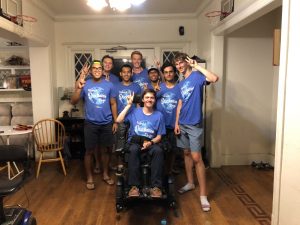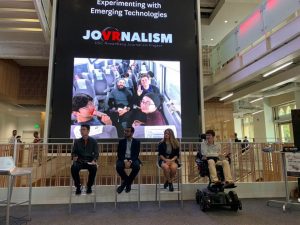Learning to Be Social with Duchenne

Living with Duchenne makes a lot of things difficult, including socializing with other people. Throughout my life, especially as the disease has progressed, it’s gotten harder to relate to people without physical disabilities. Even with the added difficulty, I’ve succeeded socially by carefully choosing the people I surround myself with, trying not to worry about what other people think of me, being bold, and seizing the day.
It’s important, from a very young age, to select friends who both understand your condition and can see past your disability. Early on in my social life, there were some friends I tried to run with because they seemed “cool” to me.
What a mistake that was. I attempted to keep up with people when I physically couldn’t, and ultimately, they didn’t care how I felt. Once some physical things became too difficult, I realized that people were leaving me out because they didn’t know what to do with me.
As I matured, I quickly realized that I focused on the wrong people and neglected the real friends around me in favor of the group I thought would make me look and feel better. My parents told me it was OK to move on from people who didn’t care about me, and once I took that advice I felt a weight lift off my shoulders.
Join our MD forums: an online community especially for patients with Muscular Atrophy.
I’ll admit I did not wholeheartedly take my parents’ advice until I was a junior at the University of Southern California. Since then, I’ve learned to discern how people interact with others, what they believe, and what their motives are. These things determine whether a friendship is worth pursuing.
As I’ve become more comfortable with the idea of moving on from some friends, while still being amicable with them, life has become a lot fuller. Knowing that I have people around me who care and are willing to jump at the opportunity to help me out gives me comfort. I always try to interact with people with the same love of Christ, so I’m never cold to anyone, but I’ve realized some relationships are just not meant to be.
People today always worry about how they appear to people around them. I subscribed to that societal ideal for a long time, and it’s still something that I struggle with. It’s especially difficult being in a wheelchair. People sometimes stare at me or are thrown off guard when we meet in real life. They don’t expect me to be successful. It’s not their fault, but rather more a failing of the society we live in today.
I look at myself from others’ perspectives and wonder if people see that I am able to walk even though I use a wheelchair, will they think I’m a fraud? Will they think less of me because they are forced to look down at me in my chair? Does the way I walk look weird to them?
I know who I am and what I’m capable of. I can’t avoid people for fear of not living up to their expectations of being a “normal” human being. I have to disregard the thoughts of others so I can grow, laugh, and learn from the people around me.
Not letting the perceptions of others impact you goes hand in hand with being bold and seizing the day. I would not have gotten into journalism, had many friends, or been able to ask a girl out without letting go of the worry about what other people think. It’s hard to do everything that’s expected of you socially when you have a rare physical disease, but it will be a lot easier if you focus on the people around you who matter and drown out the rest of the noise.
***
Note: Muscular Dystrophy News is strictly a news and information website about the disease. It does not provide medical advice, diagnosis or treatment. This content is not intended to be a substitute for professional medical advice, diagnosis, or treatment. Always seek the advice of your physician or another qualified health provider with any questions you may have regarding a medical condition. Never disregard professional medical advice or delay in seeking it because of something you have read on this website. The opinions expressed in this column are not those of Muscular Dystrophy News or its parent company, Bionews Services, and are intended to spark discussion about issues pertaining to muscular dystrophy.









Martha Leslie
Wonderful article! Thank you for sharing your journey with us.
Steffni Randle
Just want to make true friends that can understand what it is like to live with muscular dystrophy